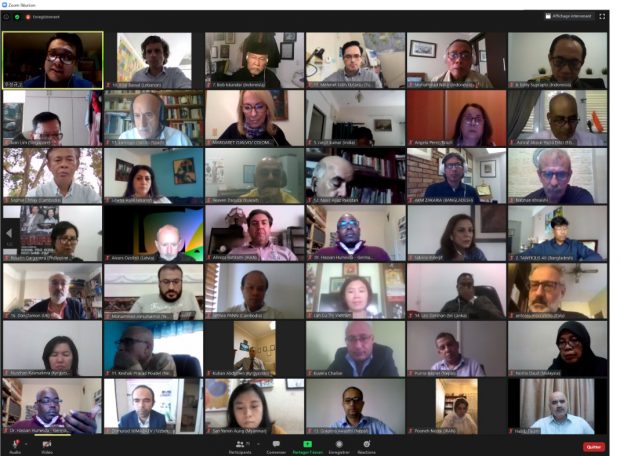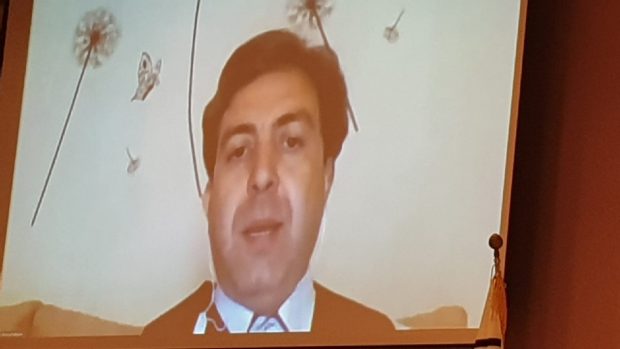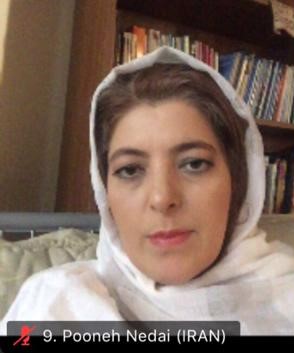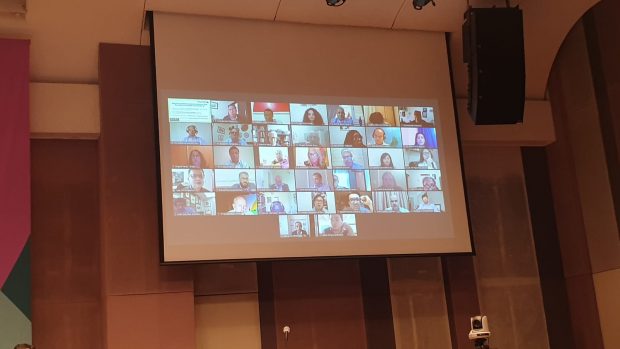85 journalists from 53 countries exchange views on global issues at WJC 2020

A section of the participants (Picture by Bilal Bassal)
By Alireza Bahrami
Head of Arts and Culture, ISNA, Iran
AsiaN Contributor
TEHRAN: The 8th Annual World Conference of Journalists (WJC 2020) in South Korea was held online this year due to travel restrictions due to the outbreak of COVID-19.
The three-day conference (September 14-16) had three main topics that were covered in three days of lectures and Q&A: Fake News and the Future of Journalism, Global Responses to COVID-19, and Methodology Disease Control and the 70th Anniversary of the Korean War and Peace Policy on the Korean Peninsula.
The global conference was attended by journalists and researchers from 53 countries. Some of these 85 participants from 53 countries spoke on these three topics (one topic each day).
From Iran, Alireza Bahrami (on the first day with the topic of Fake News) and Pooneh Nedaei (on the third day with the topic of peace between the two Koreas) spoke.
JAK (Journalists Association of Korea) president Kim Dong Hoon and Korea’s Prime Minister Chung Sye-kyun were also speakers at the conference. In their speeches, they described the conference as a model for activities during the epidemic.
* Fake News, an Opportunity for the Governments

Alireza Bahrami addressing the conference (Picture by Sang-ki Lee)
Alireza Bahrami in his speech at the World Conference of Journalists 2020 (WJC 2020) said:
Over the past few years, in the Islamic Republic of Iran as in other countries of the world, the advancement of technology and the development of communication tools have led to emergence of opportunities and risks for traditional standard media. On the one hand, the media has found the opportunity to communicate with the audience in different contexts more quickly and in an extensive form, on the other hand, the economic life of some media outlets have been threatened. Although a kind of communication democracy was created for all citizens, the profiteers also found the opportunity to destroy social relations in society. In this process, fake news played a special destructive role; that is, news that’s seemingly standard news to the general public, but is in fact false news that is produced and disseminated for vile purposes, such as increasing the audience and follower in the wrong way. At the same time, in addition to the general situation, which is similar to other countries in the world, Iran is in a state of economic and political war with some countries.
Academics and experts believe that increasing the media literacy of the people is one of the most important ways to protect that society against the rapid growth of fake news. But Iran’s experience has shown that in addition to the importance of this method, there is one more guaranteed way. In Iran, in the past few years, media literacy has also become part of the school curriculum. Other activities, such as the establishment of cultural centers or media literacy associations have also taken shape. But none of them could be very effective against the spread of fake news. The experience of the events of the past few months in Iran has shown that there is another effective way for the government.
Do you remember that a few months ago, a Ukrainian plane, mostly made up of Iranian passengers was accidentally shot down near Tehran airport during the military tension between Iran and the United States? It took several days for the Iranian government to take responsibility for the accident by issuing official announcements. During these few days, cyberspace and informal networks overtook the official Iranian media and a wave of distrust of the official media emerged. The official domestic media were accused of supporting secrecy, and the space was provided for the dissemination of any true or false news in cyberspace.
A few weeks later, during the outbreak of the Covid-19 virus, the situation improved to some extent. After the first days of criticism of the Iranian government’s approach to informing about Covid-19 disease, continuous information and trust in the functioning of official and standard media made the space for fake news more and more difficult. The spokesman of the Ministry of Health of Iran held a daily press conference for the media and the necessary information was regularly transmitted to people. The media, due to their social responsibility, constantly examined the government’s activities in this field. In Iran, too, in the early days, the market for speculation and the dissemination of baseless information was hot in cyberspace. Economic profiteers also prospered by spreading false rumors that the use of a particular seed or herbal spice, for example, was effective in preventing the new Corona virus. However; the continuation of the government’s response method, as well as the continuation of the disease itself, caused the fake news to fade over time. The credibility of the official Iranian media, which was damaged in the plane crash, has improved.
This experience showed that one of the ways to protect any society from fake news is to have a high level of accountability of the officials of that society. As we all know, one of the reasons for the spread of fake news in society is that in addition to having the appearance of true and professional news, these news pay attention to the needs of society and try to address the concerns of the people; to be more welcomed.
Therefore, it can be said that the spread of fake news has created a golden opportunity for governments like Iran to create a better situation for themselves and the people by preventing their harms by responding to the information needs of society and approaching the will of the people.
*Iran and the two Koreas

Pooneh Nidai
Pooneh Nedaei in her speech at the World Conference of Journalists 2020 (WJC 2020) said:
I have a perfect reason to choose the topic of peace in Korean peninsula and 70th anniversary of Korean War, since I am from a country that was involved in an 8-year old war with Iraq and now has a shaking situation to remain in peace. Iran is under a heavy sanction of US while the pandemic situation affected our country like many other countries. We are facing the economic pressure, struggling to stay alive under the stress of trigger of US and Covid 19.
Iran and Korea have a long historical relationship within 1500 years through the Silk Road. There are pieces of Persian glass in National Museum of Korea and Kushnameh is a 1500-year-old historic love story between a Persian prince and a Korean princess. Iran and Korea’s diplomatic relation goes back to 60 years ago.
The latest economical relation was the huge market of Korean goods in Iran and oil trading. Actually, Iranian people mostly believe that Korean products are reliable and have high quality. Korea had to end oil trading with Iran for the sake of US sanction. Last year, LG and Samsung had to stop their household appliances activity in Iranian market. At same time, as Chosun Ilbo wrote: South Korea had to block 6 billion $ of Iranian right due to oil import in two Korean banks. It is sad that the two friendliest countries; Iran and Korea must be patient and find solutions for continuing their relations. Although I believe cultural exchange should not be stopped in any situation. Now you may imagine our country (Iran) has to stay strong and people have to survive in such a sanction period.
In such a situation, South Korea has its own tendency to stay in peace with North Korea.
Whenever I think of Korean union, I remember the famous photo that shows a little bird flying over the border between south and north. I can feel how Korean people dare to be like a bird to fly to each side of their brother land easily.
When the world saw the picture of meeting between the leaders of North and South in 2018, some hopes raised for initiation of brotherhood for the sake of Korean peninsula and world peace, but when North Korea blew up joint liaison office with South in Kaesong, it seemed that nothing has changed between the two brothers.
We as journalists are only politic viewers. We are journalist to witness the people desires and hopes in such a stressful period of human life.
I personally believe that the two brothers with two different strategies will never give up protecting Korean peninsula because they know that the whole land is the heritage of their ancestors. I will not mention the US role in Korean issue because I believe the role of US may have different effects and results in each region.
Korea is a strong country that could survive the war and came back to power like a phoenix. There are lots of stories, films and theaters which show the pain of Korean people during the war and at the same time their admirable resistance to keep Korea alive.

Participants in WJC 2020 (Picture by Sang-ki Lee)

























































